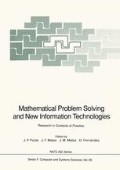Abstract
The role of the computer environment on the problem solving processes is investigated in two kinds of situations in geometry: (a) situations in which the computer giving “objective” feedback is used as a tool and (b) situations in which the computer provides an aid based on an evaluation of the performance of the student (guided activity). In the first kind of situations, we analyze to what extent the constraints and feedback of a computer environment may affect the solving processes and the kind of solution elaborated by the student. After presenting the general principles underlying what an intelligent help provided by a computer environment can be, an example is proposed in the case of a specific geometrical task for which a prototype “Hypercarré” has been designed.
Access this chapter
Tax calculation will be finalised at checkout
Purchases are for personal use only
Preview
Unable to display preview. Download preview PDF.
References
Artigue, M., Bclloc, J., & Touaty, S.: Une recherche menée dans le cadre du projet Euclide, IREM de l'Université Paris VII 1987
Barz, W., & Holland, G.: Intelligent tutoring systems for training in geometrical proof and construction problems. In: Learning and instruction, European research in an international context (H. Mandel, E. De Cone, N. Benett, & H. F. Friedrich, eds.). Oxford: Pergamon 1989
Boero, P.: The crucial role of semantic fields in the development of problem solving skills in the school environment (In this volume) 1991
Brousseau, G.: Fondements et méthodes de la didactique des mathématiques. Recherches en Didactique des Mathématiques, 7(2), 33–115 (1986)
Duval, R.: Pour une approche cognitive des problèmes de géométrie en termes de congruence. In: Annales de didactique et de sciences cognitives, Université Louis Pasteur et IREM de Strasbourg, Université Louis Pasteur, Vol. 1, pp. 57–74 (1988)
Fisher, N.: Visual influences of figure orientation on concept formation in geometry, in Recent research concerning the development of spatial and geometric concepts, ERIC, pp. 307–21 (1978)
Gras, R.: Une situation de construction avec assistance logicielle. Recherches en Didactique des Mathématiques, 8(3), 195–230 (1987)
Hanna, G.: Some pedagogical aspects of proof. Interchange, 21(1) (The Ontario Institute for Studies in Education) 1990
Laborde, J.-M., & Sträßer, R.: “Cabri-géomètre”: A microworld of geometry for guided discovery learning. Zentralblatt für Didaktik der Mathematik, 90(5), 171–177 (1990)
Lakatos, I.: Proofs and refutations, the Logic of Mathematical Discovery. Cambridge University Press 1976
Mesquita, A.: L'influence des aspects figuratifs dans l'argumentation des élèves en géométrie: éléments pour une typologie, thèse de l'Université Louis Pasteur, Strasbourg, 1989
Parzysz, B.: Knowing vs seeing, Problems of the plane representation of space geometry figures. Educational Studies in Mathematics, 19(1), 79–92 (1988)
Pea, R. D.: Cognitive technologies for Mathematics education. In: Cognitive science and Mathematics education (A. Schoenfeld, ed.), pp. 69–122. New York: Lawrence Erlbaum Associates 1987
Schoenfeld, A.: Mathematical problem solving. Orlando: Academic Press 1985
Schwartz, J.: Can we solve the problem solving problem without posing the problem posing problem? (In this volume) 1992
Tuyet, A.: Un développement à partir d'Hypercarré. Mémoire de DEA (Didactique des disciplines scientifiques), Grenoble, June 1991
Yerushalmy, M. & Chazan, D., Overcoming visual obstacles with the aid of the Supposer. Educational Studies in Mathematics, 21(3), 1990
Zykova, The psychology of sixth grade pupils' mastery of geometric concepts, Soviet studies in the psychology of learning and teaching mathematics, School mathematics Study Group Stanford University and Survey of Recent East European Mathematical Literature, University of Chicago, Vol. 1, pp. 149–88 (1969)
Author information
Authors and Affiliations
Editor information
Editors and Affiliations
Rights and permissions
Copyright information
© 1992 Springer-Verlag Berlin Heidelberg
About this paper
Cite this paper
Laborde, C., Laborde, JM. (1992). Problem Solving in Geometry: From Microworlds to Intelligent Computer Environments. In: Ponte, J.P., Matos, J.F., Matos, J.M., Fernandes, D. (eds) Mathematical Problem Solving and New Information Technologies. NATO ASI Series, vol 89. Springer, Berlin, Heidelberg. https://doi.org/10.1007/978-3-642-58142-7_13
Download citation
DOI: https://doi.org/10.1007/978-3-642-58142-7_13
Publisher Name: Springer, Berlin, Heidelberg
Print ISBN: 978-3-642-63483-3
Online ISBN: 978-3-642-58142-7
eBook Packages: Springer Book Archive

